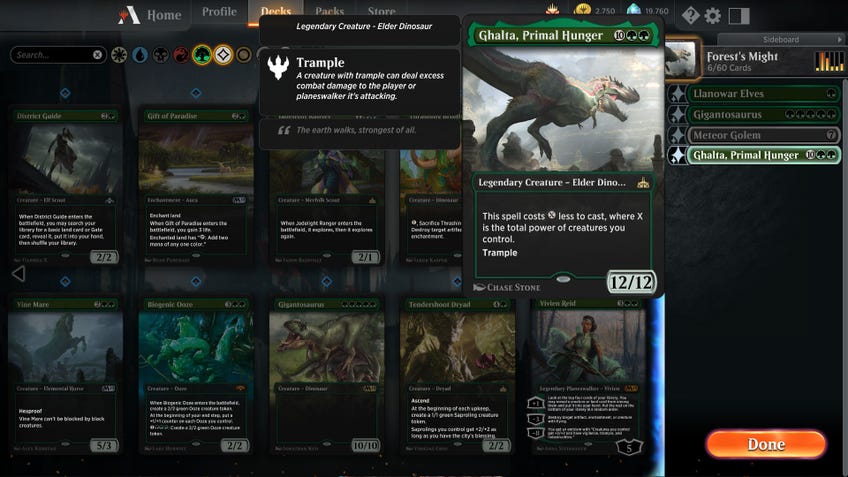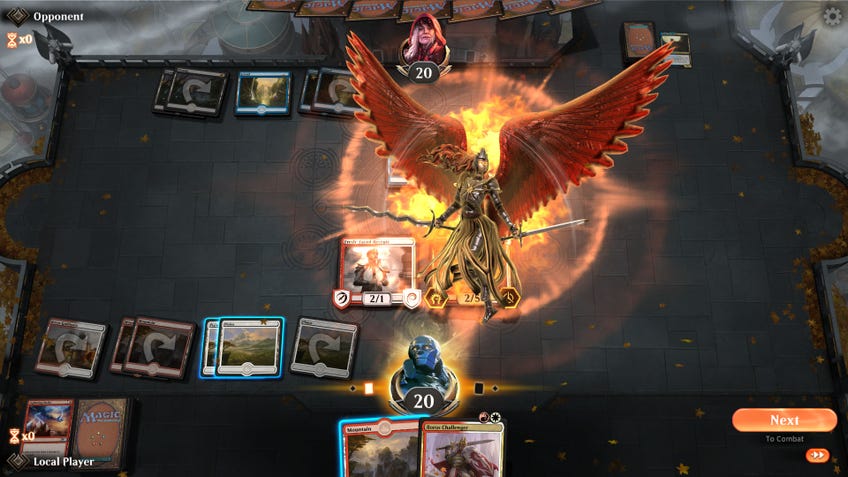Magic: The Gathering is more ban-happy than ever, and it’s holding MTG Arena back
Getting the banned back together.
Banned cards in Magic: The Gathering are a lot more common than they used to be. That’s not the needlessly hyperbolic statement of an aged and tired player, it’s just the truth. Part of that is due to the fact that as more cards get printed, and more of those get banned, then the list of banned cards obviously gets longer. However, it’s not just a simple matter of time being an unstoppable and unknowable force that’s affecting this.
The fact is, as Wizards of the Coast introduces more formats and continues along the inevitable power creep trail that MTG will probably forever be on, there are going to be more and more cards that are simply too good for the game - or at least some aspects of it.
This is especially true in the eternal constructed formats, which is basically every constructed format outside of Standard. That’s because there are more cards and mechanics there, which means there are exponentially more interactions to consider, which means things slip through occasionally and have to be banned. However, there are often bannings that make very little sense to the player base, and cards that people feel should be banned that never really are.
Generally speaking, cards get banned because they warp a format. That means that there might be a card in Standard that simply can’t be answered or dealt with, and leads to the kind of homogeneity in a game that makes every match feel the same.
The issue isn’t when a card is good, but when it’s too hard to answer.
Cards are allowed to be powerful in Magic; that’s an integral part of deck construction and a key driving force behind people opening packs and buying singles. After all, without powerful cards, everyone would be playing with basic two-mana 2/2s. While that’s fun in a draft, it’s not what people generally want from other formats. It’s important to have diversity in decks within each format to allow for multiple playstyles and, ideally, a rock-paper-scissors quality to each game.
However, sometimes cards become too ubiquitous. The issue isn’t when a card is good, but when it’s too hard to answer. Ideally, every card in every format would have a handful of cards that would be able to deal with it. It’s that idea that makes Control decks so interesting to play, because you have to try and fill your deck with the correct answers to whatever questions your opponent’s decks are going to have.

When a card is good, but also has no answers, or enables a combination of cards that can’t be dealt with in enough ways, you end up warping the format. There’s a big difference between “I can’t beat this card with my deck” and “This card can’t be beaten with anything in the format”, too. When things are in the first category, well, you just need a good sideboard, but when it’s the latter, then something needs to be banned. That’s fine and all, but it seems to have led Wizards to a point where it pre-emptively bans things just in case. Frankly, there’s not always a need for that.
The best example of this in recent times involves this year’s Strixhaven: School of Mages. Alongside the set itself came the Mystical Archive: cards from throughout the history of Magic: The Gathering that got some very pretty new artwork. These all came to MTG Arena too, but Channel, Counterspell, Dark Ritual, Demonic Tutor, Lightning Bolt, Natural Order and Sword to Plowshares were pre-banned in Historic and weren’t legal in Standard to begin with. That means, in essence, that cards have been put into the game that have no use outside of the most casual matches between friends.
You could certainly make the case that these cards would all cause fairly big waves in Historic, but it would also have been a lot of fun to actually try them out for ourselves. Bannings make sense, but pre-banning cards, especially when there are only a limited number of formats in MTG Arena, leaves a sour taste. Even if they were released with the understanding that they’d likely be banned within a month of release, that would at least allow players to use the cards first.
There’s a big difference between “I can’t beat this card with my deck” and “This card can’t be beaten with anything in the format”.
You could also argue for the necessity of yet another new MTG Arena format - something that goes beyond Historic in order to better replicate the cards available in paper. That might sound a little outlandish, but it’s clear that the paper version of MTG and the newer digital version aren’t going to match up any time soon.
Adding another format above Historic that includes these new cards would allow players to experiment more freely. It would also add better value to MTG Arena because, as it stands, the game misses out on some big releases each year with those cards that aren’t Standard-legal. There’s a good example of this that’s coming up very soon: Modern Horizons 2.

Obviously, putting new stuff in MTG Arena is a lot of work - we’re not suggesting it’s a simple matter of flipping a switch. That doesn’t mean that the game wouldn’t benefit greatly from having an influx of cards with different power levels. Historic might not be capable of handling them, and that’s fine, so give us a new format with everything in. It doesn’t have to be regulated to be enjoyable; it can be chaotic and horrendous as long as that’s exactly what you’re selling it as.
Things don’t always need to be competitive to be entertaining.
It would also add a lot of new cards to Brawl and any casual singleton formats that people want to play in the absence of proper Commander support. Not everyone can get down to a store to play Magic: The Gathering in real life, and the fact is that MTG Arena players will miss out on all of the excitement of sets like Modern Horizons 2 without the right digital support too.
Managing something like this at a competitive level would be horrific but, given that cards that have to be banned keep getting printed, maybe it’s best to just accept that things don’t always need to be competitive to be entertaining. Hell, you could literally call the new format something like Digital Kitchen Table Magic and embrace the fact that it’s going to be less serious. In the same way that not everything that’s powerful needs to be banned, not every format in existence needs to be kept on a tight leash. Sometimes we just want to run around like young puppies and make a big old mess of everything; having a digital space to do that would be a huge boon to MTG as a whole.
Without that, MTG Arena players are going to keep missing out on a lot of new things. We’ve already seen examples of this with the differences between paper Jumpstart and the digital version. It’s good to see Wizards messing around with the playspace a little bit more with the likes of sets such as Jumpstart and cards like Grist, the Hunger Tide - a planeswalker that is also a creature everywhere but the battlefield - but pre-banning cards and not allowing certain things in Arena just means that the players don’t get to do the same.
We know this sounds a little out there, but we’re firm believers in the idea that players should probably have at least as much fun as the designers of the game do - so maybe we should all get the chance to let loose a little and take a hard look at the way cards are banned in Arena and every format going. (Also, this isn’t just a long essay to say that Faithless Looting should be unbanned in Modern, but as we’re on the topic: please free Faithless Looting.)




